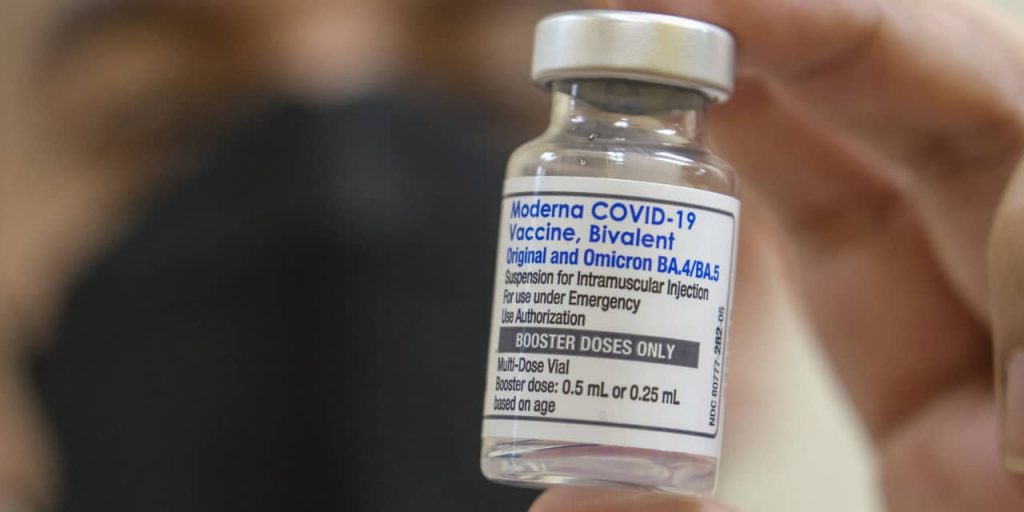With sales of its Covid vaccine sliding, Moderna is developing several combination vaccines.
Ringo Chiu/Getty Images
The biotech
Moderna
said Wednesday that its first combination vaccine, which protects against influenza and Covid-19, had succeeded in an early-stage trial and could be ready to launch as soon as 2025.
The company said that the shot had performed as well as the two stand-alone vaccines it was tested against, and that side effects were “acceptable.” It said it would start a Phase 3 trial of the shot later this year.
Investors largely anticipated the positive results, and
Moderna
shares (ticker: MRNA) dropped 2% in morning trading. In a note Wednesday morning, Jefferies analyst Michael Yee called the news an “incremental positive,” but said that investors remain focused on this year’s Covid-19 vaccine sales.
“People are still very focused on what do the Covid sales look like for this year,” Moderna CEO Stéphane Bancel acknowledged in an interview with Barron’s Wednesday morning. “People are in a wait-and-see mode.”
Bancel, however, said that there “seems to be strong demand” for the company’s updated Covid-19 shots, and that the combination shot is moving forward. “People who understand the platform are saying, look, I give it very high odds…of launching in [2025],” he said.
The combination jab is central to Moderna’s postpandemic strategy, as the company works to find a path forward as Covid-19 vaccine revenue craters. Sales of the Covid-19 vaccine—the pandemic-era blockbuster that remains its only approved product—are dropping. Analysts expect the company’s sales to fall to $7.1 billion this year from $19.3 billion in 2022, according to FactSet.
Moderna shares, meanwhile, are down more than 40% this year and have stubbornly refused to rebound, even amid signs suggesting that uptake of this year’s updated Covid-19 vaccine may be better than expected, along with positive data from its vast pipeline of experimental medicines.
The company is betting big on the new shots, which provide protection against a number of respiratory illnesses. It has a number of the combination shots under development, including shots that also offer protection against respiratory syncytial virus. The company says its combination vaccines could buoy sales of its respiratory franchise to between $8 billion and $15 billion by 2027.
The new data Wednesday on the combination vaccine is a small step in that direction. The first combination vaccine is called mRNA-1083; it mixes an experimental Moderna Covid-19 vaccine called mRNA-1283 and an influenza vaccine, mRNA-1010. Moderna announced positive data on a trial of the influenza vaccine last month, and hopes to launch it as a stand-alone shot next year.
The experimental Covid-19 vaccine, mRNA-1283, can be stored in a refrigerator rather than a freezer, and the company expects to roll it out in place of its current Covid-19 vaccine next year.
The combination vaccine trial, whose results were announced Wednesday, measured immune responses induced by the vaccine, not real-world efficacy. The company said that immune responses the combination shot induced against influenza viruses were “similar to or greater” than those induced by the stand-alone influenza vaccines it was tested against, which were either
GSK’s
(
GSK
) Fluarix or
Sanofi’s
(SNY) Fluzone HD, depending on the patient’s age.
The immune responses to the virus that causes Covid-19 were similar to those induced by a stand-alone Moderna Covid-19 vaccine.
Investors will likely be paying closer attention to the vaccine’s side-effect profile. Standard influenza vaccines generally have no negative side effects, but mRNA-based vaccines like those made by Moderna can induce reactions like fever. A significant side-effect profile could dampen the drug’s commercial prospects.
Moderna said that the combination shot’s reactogenicity profile, or the short-term responses like headache and fever, were “acceptable” and were similar to those seen by patients in the trial who only received the company’s Covid-19 vaccine. The company said that less than 4% of patients who received the combination vaccine had experienced grade 3, or severe, responses.
“Basically, it’s not worse. It’s like the Covid product,” Bancel said of the side effects of the combination vaccine. “So we think, again, from a high-risk population that wants to be protected against Covid, it’s going to be similar to just getting a Covid shot.”
Bancel said that the combination shot would mean more convenience for consumers and healthcare professionals. “Look at the warehouse distribution issue that happened in this launch,” he said, noting the rollout delays of the updated Covid-19 vaccines this fall.
Moderna said it would begin a Phase 3 trial of the combination vaccine this year. The Phase 3 trial won’t directly test the vaccine’s efficacy but will be what’s known as an immunobridging trial, which looks at immune responses to the shot. The company hopes for Food and Drug Administration approval in 2025.
Write to Josh Nathan-Kazis at [email protected]
Read the full article here
